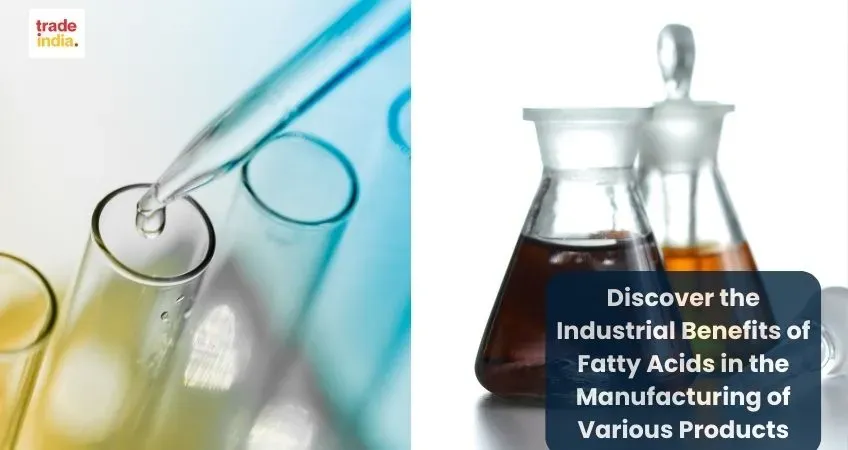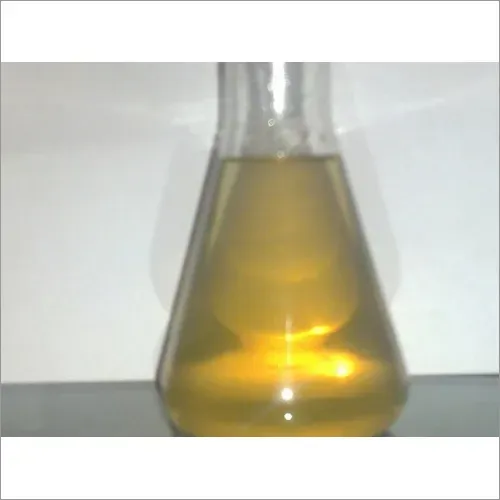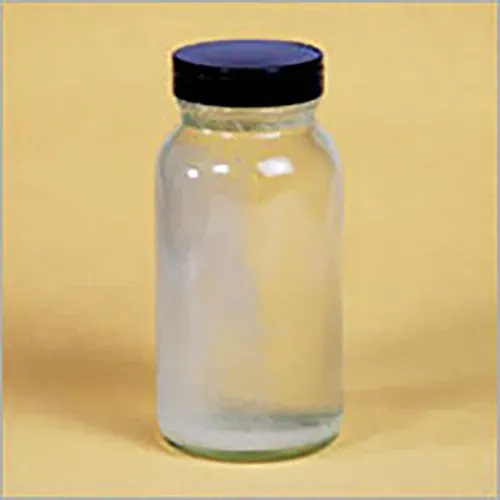Discover the Industrial Benefits of Fatty Acids in the Manufacturing of Various Products

Fatty acids are utilized extensively across various industries facilitating the manufacturing process of a diverse range of products. The unique properties of fatty acids make them irreplaceable for producing soaps, detergents, cosmetics, lubricants, etc. Prepared from vegetable or animal oils, these compounds have numerous qualities to enhance product performance, provide excellent texture, and add many more essential qualities required to access industries for specific requirements. This article shares in-depth knowledge about the industrial benefits of fatty acids and why they are essential for manufacturing various products.
What are Fatty Acids?
Fatty Acids are highly versatile organic compounds used across industries for various applications. Classified as saturated, unsaturated, and trans fatty acids, their chemical structures and properties vary significantly. Depending on their qualities, roles, and benefits they are hired across industries like food & beverage, cosmetics, biofuels, lubricants, etc.
Major Types of Fatty Acids
Saturated Fatty Acids
These types of fatty acids stay solid at room temperature and are derived from animal fats including butter and lard, and even from specific plant oils including coconut and palm oil. They are highly stable and resistant to the oxidation process significantly. An example of saturated fatty acid is palmitic acid, derived from meat, palm oil, etc.
Unsaturated Fatty Acids
These types of fatty acids remain in liquid form at room temperatures, are unstable, and oxidize. They are classified into types: Monounsaturated Fatty Acids and Polyunsaturated Fatty Acids.
- Monounsaturated Fatty Acids or MUFAs: one of the primary examples of a monounsaturated fatty acid is oleic acid predominantly found in olive oil. Other sources of MUFAs are avocados, nuts, canola oil, peanut oil, sesame oil, and safflower oil.
- Polyunsaturated Fatty Acids or PUFAs: fish oils, flaxseed, and walnuts are the few sources of PUFAs, from which fatty acids like linoleic acid, alpha-linolenic acid, eicosapentaenoic acid (EPA) and docosahexaenoic acid are derived.
Trans Fatty Acids
Trans fatty acids are unsaturated fats that are used both naturally and artificially in manufacturing various products. Natural trans fatty acids are commonly found in meat, dairy products, etc. Whereas, artificial acids remain solid at room temperature and are found in processed foods, margarine, etc.
Key Benefits of Fatty Acids Across Industries
Benefits of Fatty Acids in the Soap and Detergent Industry
Fatty acids facilitate the process of saponification and it is the sole reason for their high demand in the detergent industry. During this process, the acids react with lye producing soap efficiently. The reaction offers lathering and emulsifying properties to large quantities of soap produced through this process. Fatty acids in detergents improve their cleaning power and provide the ability to foam so that the dirt particles, oil, or grease can be broken down efficiently rinsing them off from the surface.
Benefits of Fatty Acids in the Cosmetic and Personal Care Industry
Fatty acids are one of the essential ingredients in the cosmetic and personal care industry due to their unique emollient and moisturizing properties. Cosmetic and personal care products with fatty acids help moisturize, hydrate, and help improve the texture of the skin. Furthermore, until the effect wears off, it forms a protective layer on the skin preventing environmental damage. Most commonly, fatty acids are found in the formulation of creams, lotions, and many other types of personal care products. Aside from the product quality, there are various health benefits of fatty acids infused with such products including boosting skin health, reduced inflammation, and improved skin tolerance.
Benefits of Fatty Acids in the Food Industry
Fatty acids play a significant role in the food industry as they are used as food additives, preservatives, and essential nutrients. They contribute to the production of margarine, shortenings, and other food products, providing desired textures and stability. Nutritionally, fatty acids are vital for human health, offering benefits such as improved cardiovascular health, cognitive function, and anti-inflammatory effects. Their inclusion in various food products helps enhance flavor, shelf life, and overall nutritional value, making them indispensable in modern food processing and manufacturing.
Industrial Lubricants and Fatty Acids
The primary reason why fatty acids are extensively used in the production of industrial-grade lubricants is that they offer efficient lubricating properties and off-the-charts biodegradability. With this, the friction between the mechanical parts of various machines can be reduced, extending their lifespan, performance, and efficiency. Mostly, the benefits of fatty acids in lubricants benefit the automotive and maintenance industry, improving the overall efficiency and performance of the various machines without going complex. Moreover, their natural properties make them environmentally friendly and an alternative to synthetic lubricants.
Fatty Acids in the Production of Biofuels
Fatty acids are the most essential ingredient for the renewable energy sector to produce an environmentally friendly alternative to fossil fuels called biofuel, a clean energy product that does not compromise the performance levels of equipment and machinery. Promoting the circular economy, biofuel helps reduce dependency on fossil fuels, prevents greenhouse gas emissions, and offers many more advantages.
Other Industrial Applications of Fatty Acids
Beyond the aforementioned industries, fatty acids have a wide range of applications in the production of plastics, rubber, paints, coatings, adhesive glues, pharmaceuticals, and medical products. In plastics and rubber manufacturing, fatty acids act as plasticizers and stabilizers, enhancing the flexibility and durability of products. In the paint and coatings industry, they improve the spreadability, gloss, and drying time of products. Additionally, fatty acids are used in pharmaceuticals for their therapeutic properties and in medical products for their biocompatibility and efficacy.
Economic and Environmental Benefits
The use of fatty acids in industrial applications offers significant economic and environmental benefits. They are cost-effective, readily available, and derived from renewable sources, making them a sustainable choice for manufacturers. Fatty acids contribute to reducing the environmental impact of industrial processes by promoting biodegradability, reducing greenhouse gas emissions, and supporting eco-friendly product development. Their versatility and multifunctional properties make them a valuable component in various industries, driving innovation and sustainability.
Properties of Fatty Acids
Chemical Stability
Industrial fatty acids are chemically stable, meaning they don’t break down easily under normal conditions. This makes them reliable for use in various products that need to last a long time without degrading.
Solubility
Fatty acids can dissolve in oils and organic solvents but not in water. This property is important for making products like soaps, detergents, and cosmetics where mixing with water is essential for use.
Emulsifying Ability
Fatty acids help blend water and oil together, which is crucial for products like lotions and creams. This ability makes them valuable in the cosmetic and food industries.
Lubricating Properties
Fatty acids reduce friction between surfaces, making them excellent for use in industrial lubricants. This helps machinery run smoothly and reduces wear and tear.
Biodegradability
Many industrial fatty acids break down naturally over time, making them environmentally friendly. This is important for products that need to be sustainable and eco-friendly.
Versatility
Fatty acids can be used in a wide range of industries, including food, cosmetics, pharmaceuticals, and industrial applications. Their flexibility makes them a popular choice for various products.
Moisturizing Effect
In cosmetics, fatty acids help keep the skin hydrated and soft. This property is why they are commonly found in skincare products like lotions and creams.
Nutritional Value
Certain fatty acids are essential for human health, providing benefits like improved heart health and brain function. They are often added to food products to enhance nutritional value.
Reactivity
Fatty acids can react with other chemicals to form different products, such as soaps when they react with lye, or biodiesel when processed with alcohol. This reactivity is key for many manufacturing processes.
Related Blog:


